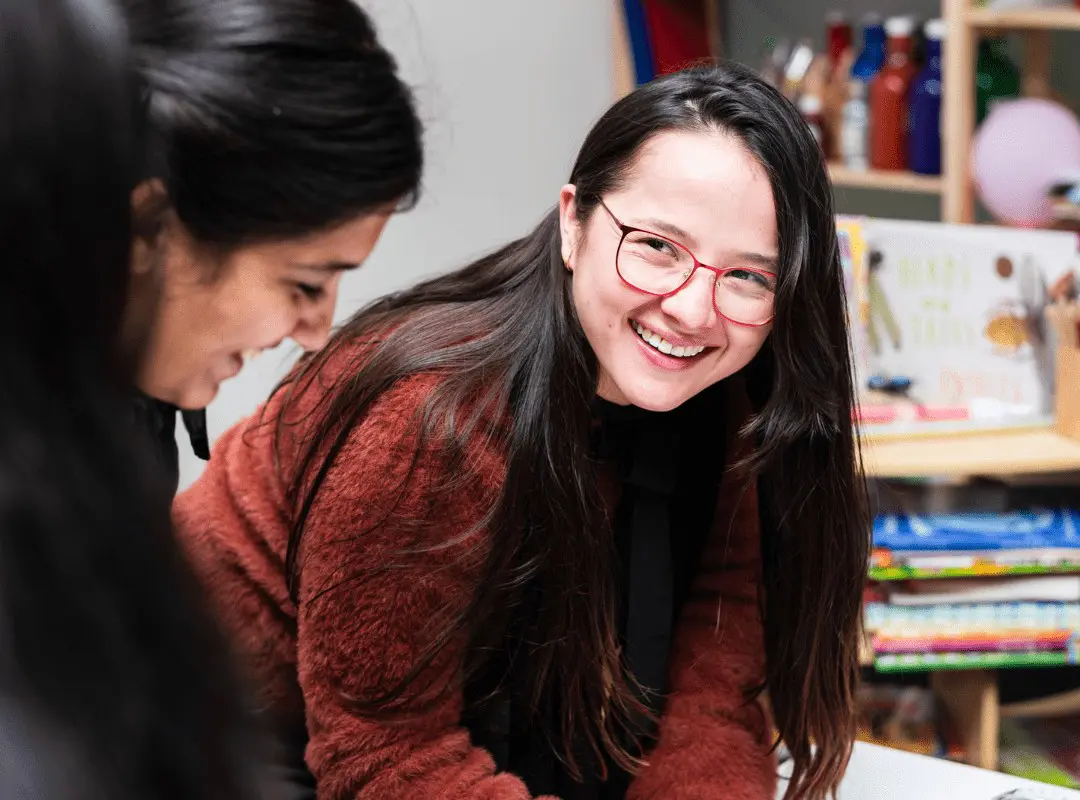Overview
Our Diploma of Counselling and Psychotherapy invites you to explore the complexities of the human mind, using diverse disciplinary perspectives including scientific, philosophical and spiritual disciplines.
Beyond academic learning, the course focuses on understanding human emotion and thought, enhancing your ability to connect with and help others on a deeper level. Throughout the course, you will develop fundamental skills essential for counselling and psychotherapy. This includes learning ethical, culturally sensitive, and collaborative practices to design early intervention programs tailored to client goals and individual diversity.
The course also includes a clinical placement. This invaluable hands-on experience allows you to apply your classroom learning to real-world scenarios, enriching your theoretical knowledge and preparing you for professional work after graduation.
Key Information
| Award | Diploma of Counselling and Psychotherapy |
| Duration | 1 Year Full Time (or Part Time Equivalent) |
| Study Mode | On-Campus Online* |
| Locations | Melbourne, Sydney, Online |
| Intakes | February, May, September |
| Course Fees | Domestic (FEE-HELP available) International |
*International students may study up to one-third of the subjects in a course online. Domestic students may study the full course online.
Trimester 3, 2025 Applications Close
Career Opportunities
The Diploma of Counselling and Psychotherapy prepares graduates for an exciting career as an entry-level counsellor, case manager, intake counsellor, welfare counsellor, program coordinator, disability support worker or counsellor support worker. You may find opportunities in a diverse range of organisations including mental health facilities, rehabilitation centres, social service agencies, schools, and non-profit organisations.

Course Structure
You must successfully complete 8 subjects, totalling 48 credit points, to complete the Diploma of Counselling and Psychotherapy. Each subject is specifically designed to provide you with the essential skills and understanding to excel in the field of counselling and psychotherapy.
The course also includes 1 supervised placement experience totalling 120 hours.
If you plan to study full time, a full-time load is typically 8 subjects per year. For part-time students, you will typically complete 4 subjects per year. Please note that our academic year is structured into three trimesters, each consisting of 11 weeks of teaching followed by an exam week.
Delivery & Workload
We’ve created a diverse and engaging learning environment for this course. Your study will involve a mix of lectures, tutorials, skills development activities, group work, self-directed study and workplace learning. For each subject, allocate about three hours for lectures and tutorials. Additionally, you should allow approximately 10 hours per week per subject for self-directed study to complete prescribed readings, practice skills, conduct research, and complete assessments at your own pace.
Subjects
Year 1
This subject, the first in a developmental sequence of study, sets the foundation for your knowledge and skills in counselling and integrative arts therapy practice. You will be introduced to a comprehensive theoretical framework for your practice encompassing person-centred and experiential psychotherapy, Eastern and Indigenous practices and psychodynamic interpersonal therapy originating in the work of Carl Rogers, Eugene Gendlin and significant humanistic-existential and psychodynamic theorists and practitioners.
Key concepts within this framework, such as the actualising tendency, the significance of developing ‘therapeutic relational depth,’ and the differentiation between the ‘real’ self and the externally constructed ‘false’ self, are examined. Additionally, you’ll explore ‘Dadirri’ deep listening, therapeutic presence, and engagement as foundational elements for your work, while also exploring the differences between the therapeutic relationship with ‘relational depth’ and the ‘therapeutic alliance.’ The ultimate objective is to enable you to integrate experiential relational theory into your practice.
Subject Code: SOC101
Credit Points: 6
Co-Requisite: COU102 Integrative Psychotherapy in Practice
The second subject in the developmental sequence of integrative psychotherapy practice focuses on building the essential knowledge and core skills required for counselling and therapeutic practice. Through one-to-one therapeutic interactions with peers, you will share and work with your own ‘lived experience’ in sessions. Using interventions and processes, you will build and strengthen therapeutic relationships and support clients to access and explore inner experiences. You will also apply foundation and intermediate counselling skills in various situations, observe counselling practice interactions and engage in thoughtful reflection on your practice of micro skills in integrative counselling and psychotherapy.
Subject Code: COU102
Credit Points: 6
Co-Requisite: SOC101 Integrative Psychotherapy in Theory
You will develop an understanding of the main theoretical perspectives and models that influence therapeutic practice and facilitate therapeutic change. This covers various approaches such as psychodynamic, humanistic-existential, experiential-emotion-focused therapy, cognitive behavioural, transpersonal and soul centred, post-modern, and integrative schools. You will also learn to recognise major theoretical perspectives, concepts and explanatory frameworks used in counselling and psychotherapy. The different approaches will be examined, including their underlying theory and techniques. The models studied will be contextualised within an integrative conceptualisation framework and you will have opportunities to apply theory in practice through case scenarios.
Subject Code: COU103
Credit Points: 6
This subject is designed to develop your awareness and understanding of the ethical and legal issues critical to counselling and psychotherapy practice. You will learn about ethical principles, theories and frameworks that guide behaviour and decision making, including relevant legislation and professional codes of ethics within the Australian professional landscape. By analysing scenarios, you will identify ethical and legal issues and recommend solutions to common dilemmas in therapeutic practice, such as those related to confidentiality, informed consent, power dynamics and managing professional boundaries. You will also explore how your personal, social and professional values may influence your decisions and actions.
Subject Code: COU104
Credit Points: 6
This subject explores the varied experiences of consumers using mental health services in Australia and assesses the current system’s strengths and weaknesses. It provides an understanding of the cultural evolution of perceptions regarding ‘normal and abnormal behaviour’ over time, as well as the historical emergence of the Diagnostic and Statistical Manual of Mental Disorders (DSM) for diagnosis, including its rationale and criticisms. You will learn to identify key terms and major categories of the current classification systems in psychopathology, while also developing skills to effectively respond to clients in mental health crises and those experiencing suicidal tendencies.
Subject Code: COU105
Credit Points: 6
In this subject, you’ll explore the ethical foundations of individual worldviews which can unconsciously shape prejudices and biases. You will gain the knowledge, skills and awareness required to engage in ethical and culturally mindful therapeutic practices. Through a curriculum focused on culture and diversity, independence, autonomy and philosophy, you will examine the versatility of embedded identities and their influence on beliefs, values and biases, both positive and negative. Awareness of stereotyping, privilege, poverty, racism, ageism, misogyny, homophobia and other forms of oppression will prepare you for addressing the worldviews and challenges of specific client groups.
Additionally, you will explore how minority stress can contribute to trauma, shame, interpersonal difficulties, self-criticism, lack of personal agency, anxiety and depression and how these experiences may influence the therapeutic relationship. You will also develop cross-cultural skills essential for working with diverse populations such as Aboriginal and Torres Strait Islander individuals, families and communities, learning how to approach their therapeutic needs and healing.
Ultimately the subject aims to foster an understanding that ethical behaviour and cultural competence extend beyond having an awareness of individual and cultural differences, embracing a commitment to eliminate unconscious bias and discrimination in therapeutic practice.
Subject Code: SOC106
Credit Points: 6
This subject will introduce you to the practice of case conceptualisation in clinical settings, guiding treatment planning and interventions during your supervised practice in Supervised Practice A. The emphasis will be on short-term treatment planning, helping you to articulate a clear theoretical understanding of the client’s situation, background, challenges, patterns, and distress from various theoretical perspectives and through an integrative approach. You will also learn to develop hypotheses about the client’s reasons for seeking therapy and their underlying needs. The subject focuses on developing treatment plans to facilitate change, encouraging therapists to deeply consider the client’s circumstances. You will be expected to bring your own client data to the workshops, whether obtained during placement or from peer practice.
Subject Code: COU107
Credit Points: 6
Pre-Requisites: All Year 1 subjects
Co-Requisite: COU108 Supervised Practice A
This subject is the first of two professional experience subjects designed to integrate coursework within a supervised work-based setting. It provides you with the first opportunity to apply theoretical and reflective learning to counselling and psychotherapy practice as you complete 120 placement hours at a host organisation.
The placement focuses on providing a combination of information and practical assistance to mental health service users, emphasising the early interactions between the service users, the student therapist, and the service organisation. This includes activities such as welcoming and engaging new clients, conducting intake and assessment, providing information about policies, services, and referrals, listening to client feedback, and when appropriate, leading, assisting or observing individual or group sessions.
For community health and support providers, direct client practice also involves activities such as providing meals or supplies, engaging in informal conversations for mental health and wellbeing check-ups, assisting clients with paperwork and digital processes, offering mentorship and companionship to those needing social support, accompanying individuals to outings/appointments, and facilitating skills-building exercises.
Subject Code: COU108
Credit Points: 6
Hours: 120
Pre-Requisites: All Year 1 subjects
Co-Requisite: COU107 Case Conceptualisation

Recognition of Prior Learning
At Ikon, your past studies or work experience can be acknowledged through Recognition of Prior Learning (RPL) or Credit Transfer. RPL evaluates your previous skills and experience against the learning outcomes of Ikon subjects, potentially exempting you from studying certain subjects. Credit Transfer allows your previous studies to contribute towards your qualification, granting credits based on matched content and learning outcomes between equivalent qualifications. These pathways could help you to fast track your qualification, reducing study time and tuition fees.
Credit Pathway
Our Diploma of Counselling and Psychotherapy graduates can advance directly into the second year of our Bachelor of Counselling and Psychotherapy. Eligible applicants will be guaranteed 48 credit points out of a total of 144 points for our Bachelor of Counselling and Psychotherapy.
Entry Requirements
We welcome students from all circumstances and academic backgrounds to apply for this course. Choose the admission pathway that is most relevant to your educational background.
Domestic Students
International Students
Our entry pathways include:
- Recent Senior Secondary Education: This applies to those who have completed an Australian Senior Secondary Certificate (Year 12) or its equivalent within the past two years. For guaranteed entry, an ATAR of 65 is required.
- Applicants with Higher Education (HE) study: This requires successful completion (or partial completion) of a higher education qualification.
- Vocational Education and Training (VET) study: This requires completion of a vocational qualification at Certificate III level or higher.
- Work/Life experience: If you have left senior secondary education more than two years prior to your application and have not undertaken VET or higher education study since then, you may be eligible based on your professional or work experience and/or any non-formal courses taken in preparation for tertiary study or relevant to the subject area. You must also submit a written admission statement outlining your reasons for pursuing the Diploma of Counselling and Psychotherapy. For more information about writing your admissions statement, click here.
All applicants must complete the Learner Questionnaire found in the Application Form, demonstrating their inherent qualities and motivations to succeed in the course. You may also be asked to participate in an informal interview with an Ikon representative.
To discuss the most suitable pathway for your circumstances, please contact us at 1300 000 933 or email us at admissions@ikon.edu.au
For more information, please refer to the following:
Application Process
Student Admission Policy
Inherent Requirements
Student Profile Table
International applicants must meet both the academic and English language requirements to enter this course.
Academic entry requirements
Our academic entry pathways include:
- Recent Senior Secondary Education: This applies to those who have completed an Australian Senior Secondary Certificate (Year 12) or its equivalent within the past two years. For guaranteed entry, an ATAR of 65 is required.
- Vocational Education and Training (VET) study: This requires completion of a vocational qualification at Diploma level or higher.
- Work/Life experience: If you have left senior secondary education more than two years prior to your application and have not undertaken VET or higher education study since then, you may be eligible based on your professional or work experience and/or any non-formal courses taken in preparation for tertiary study or relevant to the subject area. You must also submit a written admission statement outlining your reasons for pursuing the Diploma of Counselling and Psychotherapy. For more information about writing your admissions statement, click here.
All applicants must complete the Learner Questionnaire found in the Application Form, demonstrating their inherent qualities and motivations to succeed in the course. You may also be asked to participate in an informal interview with an Ikon representative.
English language requirements
Applicants must demonstrate a sufficient level of English language proficiency. You should have an IELTS score of 6.5 (Academic) with no less than 6.5 in Speaking and no less than 6.0 in Listening, Writing, and Reading, or equivalent.
To discuss the best pathway for your circumstances, please contact us at international@edu.com.au
For more information, please refer to the following:
Application Process
Student Admissions Policy
Inherent Requirements
Find Out More!
Complete the form below to download our course brochure and find out more about the Diploma of Counselling and Psychotherapy.

